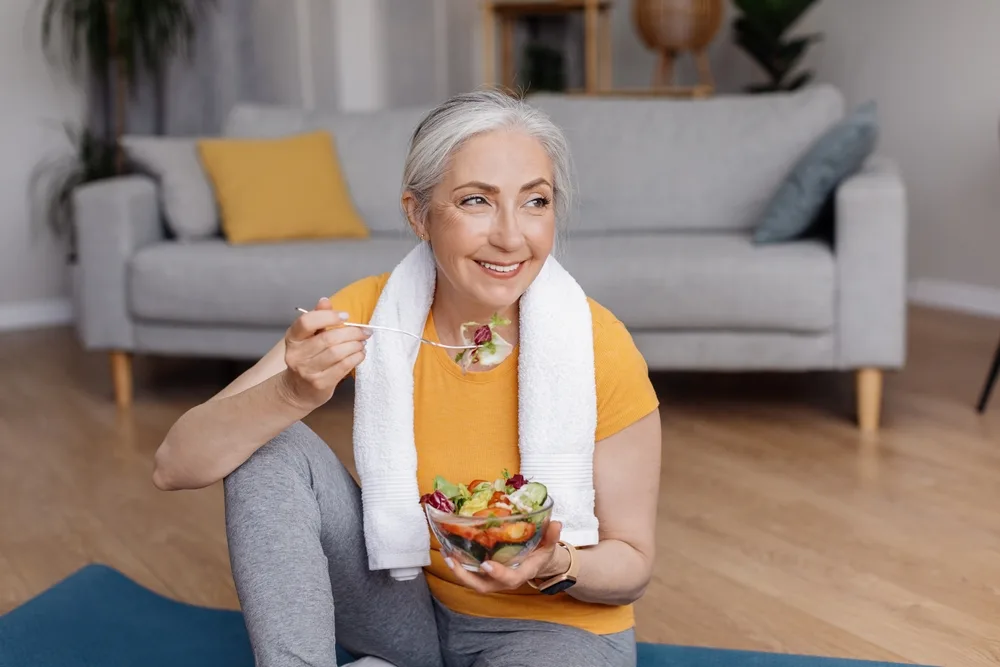Always remember that you deserve to love yourself, no matter how you appear or feel.
Inflammatory bowel disease (best food for inflammatory bowel disease) has symptoms that you can’t see, but weight loss is a visible struggle for many facing this condition. It affects both the body and the mind.
Keeping a healthy weight can be tough for people with diverticular disease an inflammatory bowel disease because their weight can change easily. In a society that admires smaller bodies; losing weight is often praised, even though it may be a sign of a serious, ongoing health issue. During that time, I lacked confidence and self-love.
Even when I felt well, I couldn’t go beyond a certain weight on the scale. It felt like I was disappearing, and I could feel bones that are usually protected by fat.
Despite the struggles, I found ways to gain and keep weight in the long run. Here are some strategies that helped me.

1. Focus on healing inflammation
The small intestine is where our body absorbs most of the nutrients from the food we eat. If someone has Crohn’s disease, which affects the small intestine, it can make it hard for them to gain and keep a healthy weight.
Even though ulcerative colitis (UC) only affects the large intestine, people with UC still need to focus on reducing inflammation. Inflammation can happen for various reasons, like problems with the gut lining, too many bacteria or fungi, and food sensitivities. Inflammation in the large intestine can also cause issues.
The more inflammation in the body, the harder it is for the body to absorb nutrients. This makes it tough to maintain a healthy weight.
I found that simplifying my diet and focusing on nutrient-rich foods helped improve my weight. I stopped eating some of my favorite gluten-free snacks and instead focused on proteins, grass-fed butter, olive oil, bone broth, teas, and herbs.
I also changed some of the products I used on my skin and in my home to reduce potential sources of stress for my body. To reduce inflammation, it’s essential to eat an anti-inflammatory diet. This means avoiding sugary foods and refined grains and emphasizing whole foods like quality proteins, fats, fruits, vegetables, nuts, and seeds. Drinking plenty of water is crucial for staying hydrated.
Some people also find relief by taking supplements like collagen, ginger, turmeric, tart cherry juice, and other foods or herbs known for reducing inflammation.
2. Don’t leave out macros
It’s important to think about what you eat every day and make sure you’re getting the right balance of nutrients. If you don’t eat enough protein, crabs, or fat, especially if you’re already underweight, it can be bad for you.
If you want to gain weight, don’t cut out any of these nutrients. Choose whole foods like sweet potatoes instead of bread, and go for chicken, beef, or fish instead of protein powders. Use oils like olive oil, grass-fed butter (if you can handle it), or coconut oil instead of vegetable oils. These foods have nutrients that are better for you.
Always make sure your plate has protein, fat, and crabs on it. It might help to talk to a dietitian or nutritionist to make sure you’re eating the right amounts for your goals.
3. Eat more calorie-dense foods
Some foods have more calories than others, which can be a great thing when you are trying to gain weight.
Fats have the most calories per gram compared to protein and carbohydrates. Foods with higher fat content like coconut, avocado, nuts — and the products made from them — are foods to consider daily.
Always make sure your plate has protein, fat, and crabs on it. It might help to talk to a dietitian or nutritionist to make sure you’re eating the right amounts for your goals.
Start to think about how you can add more of these high-calorie foods to your diet.
When I needed to gain and maintain weight, I was adding sliced avocado onto dishes, having smoothies in between meals, and snacking on rice cakes with nut butter. An extra drizzle of extra virgin olive oil or slices of avocado will add up when you make these choices consistently.
These are just a handful of ways you can start including high-calorie (but still nutrient-dense) foods to your plate.
4. Eat smaller meals more frequently
It’s common for larger meals to cause gastrointestinal distress in diverticular disease an inflammatory bowel disease Larger meals during the day could trigger diarrhea in some, which is not helpful for weight gain. If you are experiencing gastrointestinal symptoms while trying to gain weight, eating smaller meals and snacks throughout the day will likely feel better for you and not cause additional symptoms in the long run.
To ensure you have access to plenty of food options that you can reach for daily, buy and prepare some easy-to-grab foods. Some extra snacks I have stocked up on are:
- Soft-boiled eggs
- Meat sticks or jerky
- dried mango
- yogurt
- hot buckwheat cereal or oatmeal
- bananas
- applesauce
- grilled chicken strips
- smoked salmon
- gluten-free toast or waffles with jam and nut butter
Be sure to leave extra snacks where you work or wherever you spend time outside your home.
5. Supplement with liquid nutrition
Supplements with liquid nutrition are like special drinks that give your body extra nutrients. These drinks are easy to swallow and can be a good option. It can be tough to eat enough calories without feeling like you’re eating all the time. Also, not everyone’s job or lifestyle allows them to eat frequently. (www.healthdigest.com) That’s where liquid nutrition can help. It can support a nutrient-rich diet or temporarily replace solid food when needed.
A crucial point to remember is to research liquid nutrition supplements before using them. Some popular ones have poor ingredients. When trying to heal food for inflammatory bowel disease and gain weight, avoid supplements with corn fillers, vegetable oils, or artificial ingredients.
Use these liquid supplements as an addition to your diet. Have them between meals, when you don’t have time for a full meal, or as a substitute for solid food to give your digestive system a break.

6. Incorporate strength training
For so long, I did not move my body in a productive way. Aside from occasional short walks, exercise was not part of my lifestyle.
I was either too tired or afraid that the exercise would burn calories that I could not afford to lose. At that time, it did not occur to me that I should try exercising with intention.
Strength training helps build muscle, which will benefit your body composition goals. Additionally, it is important to maintain muscle mass, which being sedentary and having nutrient deficiencies puts you at risk for losing.
Try anything from lunges, squats, pushups, planks, and more. Start slow and gradually increase your reps as tolerated.
You don’t need a lot of time to do these exercises. Start your day with some of these exercises or taking breaks during your workday and pumping out a few reps.
7. Talk with your doctor about bowel resection surgery
Consider your health and overall well-being when thinking about this option. Think about the good and bad aspects, as well as your current health condition.
I suggest this option because getting surgery to remove part of my intestine helped me make significant progress in my weight and health.
Here’s how it works: A surgeon will take out the parts of your intestine that are scarred from inflammation. This includes any very inflamed areas. Without these problem areas, your body can absorb nutrients more easily, and you’ll likely experience less pain.
For me, it felt like starting fresh. After the surgery, I was able to gain weight and have kept it off for over 2 years of being in remission.
The surgery also brought other benefits, such as increased energy and fewer symptoms.
Wondering if this surgery is right for you? Talk to your doctor and have a discussion with a gastrointestinal surgeon. If you struggle with frequent flares, difficulty maintaining weight, or constant pain affecting your daily life, your doctors might think this surgery is a good option for you.
The Main Thing to Remember
Keep in mind that everybody and every case of inflammatory bowel disease journal works differently. People gain and maintain weight in different capacities.
Weight gain also takes time, especially when you’re working with inflammation and pain. Be gentle with yourself and your journey and reach out to your doctor and other health professionals that can guide and support you through this.
The most important thing I want you to take away is that you are worthy of your own love, no matter how you look or feel.
Looking back, I can see how I did not love myself in the times I really needed it. Have an appreciation for the challenges your body is pushing through and don’t lose sight of what you can accomplish.

